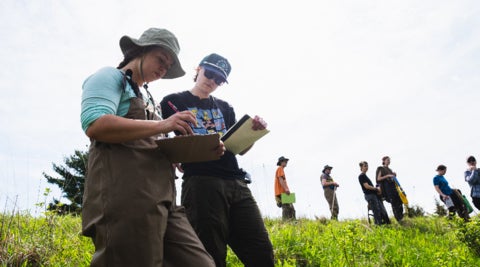Environment and Business degree

Sustainability meets profitability
Smart businesses know that sustainability must be a core part of their plan. In Environment and Business — the only program of its kind in North America — you'll develop an in-depth knowledge of environmental issues and the business world to better understand the risks that environmental challenges pose for businesses and the wider economy, and the opportunities that this understanding provides.
You'll get the foundations of a business degree with courses in economics, finance, marketing, and management, and you'll get an environmental education including field ecology and human geography. Plus, you'll learn how to integrate environment and business knowledge through specialized courses in corporate sustainability, social marketing, and more.
When you graduate, you’ll be ready to make a difference, whether that’s developing business plans for renewable energy suppliers, analyzing the environmental record of a Fortune 500 company, or helping businesses reduce their ecological impacts.
What courses will you take in Environment and Business?
First-year courses
This is a sample schedule. Courses or when a course is offered may change depending on availability.
After first year
Most of the classes you’ll take will be Environment and Business courses. With your remaining classes, you can choose electives from many of the 100 subject areas at Waterloo.
View all the courses required for your degree.
Sample upper-year courses
ENBUS 203 – Green Entrepreneurship
ENBUS 308 – Sustainability Management Standards and Auditing
ENBUS 309 – Behaviour Change and Sustainability
ENBUS 409A – Environment and Business Project
Customize your degree
You can add additional expertise to your degree by choosing one of the minors available to all Waterloo students.
Some popular choices for Environment and Business students include a specialization in Sustainable Finance, as well as minors in Geography and Environmental Management, Human Resources Management and Entrepreneurship.
Customize your degree
You can add additional expertise to your degree by adding the Sustainable Finance specialization within Environment and Business or by choosing one of the minors available to all Waterloo students.
Some popular minors for Environment and Business students include Geography and Environmental Management, Human Resources Management and Entrepreneurship.
Faculty:
Faculty of Environment
Degree:
Bachelor of Environmental Studies in Environment and Business
Available as a co-op program?
Co-op only
Available as a regular program?
No
Available as a minor?
No
Grow your own green business. Have an idea for an environmental business or social enterprise? Take a course in green entrepreneurship. Or drop by Entrepreneurship at Environment (E@E) to work on your business plan with one-on-one coaching from an experienced advisor.
20 months of job experience. You’ll get plenty of hands-on experience through 20 months of paid co-op work experience, plus a fourth-year capstone project where you’ll do sustainability consulting for real-world clients.
Co-op = relevant paid work experience
In the world's leading co-op program, you'll explore potential careers, learn to interview for jobs, graduate with up to two years of valuable experience — and make money!
Sample co-op job titles
- Marketing and business development co-ordinator
- Sustainability coordinator
- Air quality and climate change coordinator
- Research associate
- Junior policy analyst
- Corporate sustainability consultant
- Environmental technician
- Sustainability business outreach, education, and marketing coordinator
Co-op work-study sequence
Starting in second year, you'll normally alternate between school and work every four months, integrating your classroom learning with real-world experience. You can return to the same employer for a couple of work terms to gain greater knowledge and responsibility or work for different employers to get a broad range of experience.
| Year | September to December (Fall) | January to April (Winter) | May to August (Spring) |
|---|---|---|---|
| First | Study | Study | Off |
| Second | Study | Co-op | Study |
| Third | Co-op | Study | Co-op |
| Fourth | Study | Co-op | Co-op |
| Fifth | Study | Study | - |
Your first work term will be halfway through second year (January to April 2028).
What can you do with a degree in Environment and Business?
Our graduates often pursue careers in health and safety, project management, and environment. They often work in consulting, banks, manufacturing, various levels of government, and more.
Recent graduates
- Manager, Environmental Stewardship Compliance - Home Depot of Canada
- Environmental Health and Safety Specialist - NTN Bearing
- Project Manager - Peritus Environmental Consultants
- Environment, Health, and Safety Specialist - Amazon Canada
- Planning Coordinator, Climate Change - Region of Waterloo
- Project Manager, Renewal Energy - City of Toronto
- Technology Analyst - Bank of America Merrill Lynch
Learn about the future of careers in business.
Admission requirements
Ontario students: six Grade 12 U and/or M courses including
- Any Grade 12 U English (final grade of 70% is required)
Recommended courses: one Grade 12 U Mathematics, one Grade 12 U Science, Grade 12M Principles of Financial Accounting, Analysing Current Economic Issues (where offered)
Admission averages: High 70s
Not studying in Ontario? Search our admission requirements.
How to apply
Apply directly to this program on your application.
Success starts at Waterloo
As home to Canada's largest faculty of environment and the world's leading co-op program, Waterloo is the only place where you can test drive up to five careers before you graduate.



*University of Waterloo Key Performance Indicators 2024
**for social science programs, which include programs within the Faculty of Environment
Get information about programs, applying, and more!
Subscribe to our monthly newsletter
Get valuable updates and tips sent straight to your inbox!
Contact us

Questions about courses, programs, requirements, or careers?
Please contact Megan Muir, our Faculty of Environment recruitment co-ordinator who can answer any questions you have.
From the Missing Manual
As a kid growing up around the oil industry, Okeoghene witnessed first-hand the intrinsic relationship between business and the environment. Read our article on ...